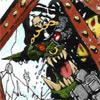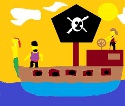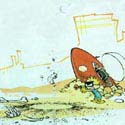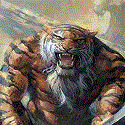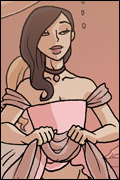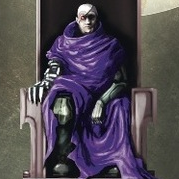|
JoshTheStampede posted:I am pretty solid on the rules and am apparently my groups Designated Vlaada Game Teacher. I'll be teaching the game to 3 medium-to-advanced board gamer people tomorrow...how bad an idea is it to use Festival Season at the same time? Unique opportunity spaces are going to increase the complexity of the building round a fair bit, each season one of the spaces will do significantly different things to what you explained at the start. There's also upgraded tunnels and two paladin rules to consider. I'd stick with the base game for teaching unless your group are pretty really comfortable with complicated rulesets.
|
|
|
|

|
| # ? May 15, 2024 18:19 |
|
Texmo posted:The element of Uncertainty in decisions was, in fact, the exact distinction which I was pointing out, and is also the 'only distinction' which you pointed out, so I don't understand how you can call it false. Even with uncertain outcomes, there is still a Correct choice; it is the choice that offers the greatest probability of success. And yes, this is even true when chooising between high risk/high reward and low risk/low reward; If this is untrue, that means you have a game where making a logical choice offers no greater odds than choosing at random, at which point you aren't even playing an actual game. Let's say you have to choose between three options: A, B and C. After thinking it over you determine that A has a 25% chance of success, B has a 50% chance of success, and C has a 75% chance of success. The Correct decision is obviously C, and the important thing to remember is that this is true even if the choosing C results in failure. If the randomizer was a simple over/under die roll, and C fails, then A and B would have failed as well. But let's imagine the randomizer was a deck of cards, where the cards simply say A, B or C, and you're betting on what the next draw will be (and let's assume that, somehow, the probabilities remain the same). If you choose C, and the next draw is A, this does not mean that A was the Correct choice. You made the rational, optimal choice, but the randomizer gave you a loss anyways. And if for some reason you chose A, and the next draw ended up being A, this still does not mean you made the correct choice. It just means you choose poorly, but randomizer gave you the win anyways. Rationally, bad decisions are bad decisions regardless of the outcome. Jaywalking through heavy 70mph traffic on the interstate is a bad decision (unless for some reason the only alternatives are even riskier), even if you make it across safely; even if you find a $100 bill lying on the other side, it was still a dumb thing to do. Also, it should be stated that almost no game with 'assured outcomes' have outcomes that are actually assure; the variance comes from the other players, which is often the entire point of those games. They are still not truly solvable, but instead it is the reactions of other players (and your reactions to their reactions) that determine success or failure. Again, if this is untrue, if there is solvable option is a competitive non-random/pre-random game, this is an example of a bad game. And indeed, Mage Knight may be one of those examples (I have not had the opportunity to play it myself yet, nor do I know whether you were playing competitive, co-op, or solo), but even if it is, this does not make it representative of games without post-decision randomness. Edit: Reworded my card game metaphor once I realized my probabilities added up to 150% Edit2: Hyperbole redacted rchandra posted:In that sort of situation in Mage Knight it's usually still interesting since you may not be able to block, or dealing with the dragon woundlessly may just use too many of your cards and you need them to attack the city soon after. So do you take the wounds, wound your units (which ones?), use more cards/skills, or even just block and not attack, sneaking by? That's quite a few interesting options on a combat that has no uncertainty itself. This is interesting; by your assessment, it seems that in Mage Knight, it is not that fighting the dragon is a solvable problem, but that it is the choice of whether to fight the dragon now, later, or even at all that is relevant decision in the later game. This makes me want to play it even more now. Maybe I should just bite the bullet and pick up a copy so I can play it solo. Paper Kaiju fucked around with this message at 04:07 on Feb 28, 2015 |
|
|
|
Paper Kaiju posted:Rationally, bad decisions are bad decisions regardless of the outcome. Jaywalking through heavy 70mph traffic on the interstate is a bad decision (unless for some reason the only alternatives are even riskier), even if you make it across safely; even if you find a $100 bill lying on the other side, it was still a dumb thing to do. Nearly any game with post-decision randomness is still just as solvable as one without, all the randomizer does allow you to win or lose despite your choice, not because of it. Practically speaking, post-decision randomness is going to lead to x different game states after the decision as opposed to a single state. For example, if you do 1 discrete point of damage, there is one possible state after that decision. If you do 2 damage 25% of the time, 1 damage 50% of the time, and 0 damage 25% of the time, you still have an expected value of 1 damage, and so this is probably still just as good a decision as you mention, but now there are 3 possible game states after you make your decision. This adds more nodes to the potential game states that one would need to solve and makes that tree a whole lot bigger and less likely to fit in a human's head. It's a shortcut to making a game feel less calculable and thus coercing you to just play via generalizations, instinct, and experience as opposed to trying to solve the game state in your head all at once. fozzy fosbourne fucked around with this message at 03:40 on Feb 28, 2015 |
|
|
|
fozzy fosbourne posted:Practically speaking, post-decision randomness is going to lead to x different game states after the decision as opposed to a single state. For example, if you do 1 discrete point of damage, there is one possible state after that decision. If you do 2 damage 25% of the time, 1 damage 50% of the time, and 0 damage 25% of the time, you still have an expected value of 1 damage, and so this is probably still just as good a decision as you mention, but now there are 3 possible game states after you make your decision. This adds more nodes to the potential game states that one would need to solve and makes that tree a whole lot bigger and less likely to fit in a human's head. This is all true, and I was not making that argument that post-decision randomness=bad (I do believe that this is often the case, but whether that is inherently true or simply a symptom or facilitator of bad game design is an entire different argument, one that has gone on often in this thread). I was making a counter-argument to the idea that games need post-decision randomness to make them unsolvable (while the lack thereof makes a game solvable), because it can still potentially lead to scenarios where there is one clear, optimal choice, which I believe is functionally identical to being solvable. Edit: I concede that I likely overexaggerated when I said 'Nearly any game with post-decision randomness is still just as solvable as one without'. Addendum: Lottery of Babylon posted:I think Cyclades is a good example of how post-decision dice can be used well. Between the extremely low variance of the combat dice (0-1-1-2-2-3) and each side only being able to lose one unit per roll, even a two-unit advantage is enough to all but guarantee a win. You commit more troops to mitigate your risk of losing some units in the process of winning the island, not to mitigate your risk of getting randomly blown out. I completely agree with this, and the only reason I ended up not liking Cyclades after roughly a dozen plays is that I Paper Kaiju fucked around with this message at 04:11 on Feb 28, 2015 |
|
|
|
dishwasherlove posted:My brother chose to put an ancient hive next to his stating tile turn 1 and rolled poorly to get his homeworld wiped off the map turn 1. Twas amazing. Sounds like you're playing it wrong, as you physically cannot die from hive bombing on turn 1. The hive ancient moves to the rolled hex after combat and everything is done, and only does combat on the following round.
|
|
|
|
Caedar posted:Sounds like you're playing it wrong, as you physically cannot die from hive bombing on turn 1. The hive ancient moves to the rolled hex after combat and everything is done, and only does combat on the following round. We moved it and he had no ships at home and we considered his home system neutron bombed but I guess if combat wasn't till turn 2 it shouldn't have bombed till then? Good to know.
|
|
|
|
Paper Kaiju posted:lots of I've only played it a couple of times myself, because that was enough to realize that I wasn't enjoying it at all. You make some good points about when MK's uncertainty happens, which has made me think more about what exactly it is that I didn't like about it, and you've put your finger on it by pointing out that the uncertainty comes as a result of -other- player's actions, not your own - you know For Certain that you can move to and defeat that dragon, and what you don't know is if somebody else will do it first (although, in my experiences, this is Not Bloody Likely, since it mostly involves players wandering around the map independently, with infrequent interaction). When given a choice between low and high risk, aside from the excitement-generating buildup and release of tension that gambles generate, there's an element of agency that players are granted - it was YOUR choice to go for the high risk option, you knew the odds, and either your gamble paid off, or it didn't. Your example is an example of bad design, as it lacks elements that would make A and B attractive choices despite their low chance of success - say, as a shoddy example, option A at 20% will be an instant kill, option B at 50% will only damage 1/3rd of the opponent's total health, and option C at 85% will block any incoming damage. If you can only survive one more hit, then it may be worthwhile to take Option A because it has a slim chance of an instant win - where Option C could possibly keep you alive long enough for your healer to heal you, but not assuredly. In this example, Reckless Option A could pay off bigtime, and so is still a valid choice. Safe Option C is also a valid choice; Since it has a high success rate, it's reasonably likely you'l remain alive - though not completely certain. Option B is the only 'poor' choice here, and only because of the low health of the player - were they able to survive more hits, it wouldn't be so poor a choice. What's important here is that neither A nor C are 'bad' choices, only Risky and Safe, and are both equally valid because of this - there's no "best" option, because either could fail. Rolling Dice to represent the action grants the player an - admittedly superficial - feeling of Agency in the outcome too - being a physical representation of taking the risk, you feel responsible for the outcome of your gamble, as you knew the odds when you took it. If you don't like the idea that you can take risky actions which might fail, then risk-based games probably infuriate you, much like how gameplay where my actions all have a guaranteed result and boil down to "find the best option after careful analysis" feels like a chore to me. edit: fozzy fosbourne posted:It's a shortcut to making a game feel less calculable and thus coercing you to just play via generalizations, instinct, and experience as opposed to trying to solve the game state in your head all at once. drat it I spent all this time thinking and typing and you go and summarize my thoughts in this one sentence. also: Paper Kaiju posted:I was making a counter-argument to the idea that games need post-decision randomness to make them unsolvable (while the lack thereof makes a game solvable) This was a pretty gross exaggeration on my part; I probably should have clarified that it was MageKnight that felt solvable to me, or at least presented reasonably obvious decisions with little sense of uncertainty about them, and that well thought out risk-based actions feel a lot less solvable and more tense. Texmo fucked around with this message at 04:56 on Feb 28, 2015 |
|
|
|
Texmo posted:This was a pretty gross exaggeration on my part; I probably should have clarified that it was MageKnight that felt solvable to me, or at least presented reasonably obvious decisions with little sense of uncertainty about them, and that well thought out risk-based actions feel a lot less solvable and more tense. MK is literally a chance based game because its a deckbuilder but somehow that is solvable? I'm really confused by that statement. Also it seems you didn't like that others players agency created some randomness in MK, but won't you have that in literally every multiplayer game?
|
|
|
|
dishwasherlove posted:We moved it and he had no ships at home and we considered his home system neutron bombed but I guess if combat wasn't till turn 2 it shouldn't have bombed till then? Good to know. That's right. It moves at the end of the turn, post-combat. So whichever place is getting invaded has a chance to defend itself. Hives aren't that scary because of that, and they have a ton of planets.
|
|
|
|
Anniversary posted:MK is literally a chance based game because its a deckbuilder but somehow that is solvable? I'm really confused by that statement. Also it seems you didn't like that others players agency created some randomness in MK, but won't you have that in literally every multiplayer game? It feels solvable on a per-turn basis, not a per-game basis, and also didn't feel that players really interacted with each other much at all. I think it comes down to it featuring a lot of exploration, without any real method of taking risks when you encounter things, since outcomes are predetermined, so it results in either "You enter the dungeon and discover a dragon, which you may defeat while taking 1 damage. Do you? Y/N", or else "You may not defeat the dragon, so you take 3 damage" I'm saying that I don't find this exciting in the slightest, and would much rather "You enter the dungeon and are faced with a dragon. You could attempt a fatality with a 15% success chance, or pull out your shield and try to block any damage with 90% success chance, or [etc]" Texmo fucked around with this message at 05:42 on Feb 28, 2015 |
|
|
|
Mage Knight has a reasonable learning curve, it sounds like you didn't reach a level of understanding that let you see the available pathways. You can mostly solve your options each turn but I generally feel like I have 2-4 significantly different options each turn. Even a winning combat often presents non-trivial decisions as to what resources to use (taking wounds is effectively expending a resource). Its quite common to see newer players frustrated that the cards tell them what to do every turn (especially zero movement or zero combat hands) because they aren't at the point of being able to plan multiple turns ahead. I could be wrong, don't know how much you played it.
|
|
|
|
Texmo posted:It feels solvable on a per-turn basis, not a per-game basis, and also didn't feel that players really interacted with each other much at all. I think it comes down to it featuring a lot of exploration, without any real method of taking risks when you encounter things, since outcomes are predetermined, so it results in either "You enter the dungeon and discover a dragon, which you may defeat while taking 1 damage. Do you? Y/N", or else "You may not defeat the dragon, so you take 3 damage" In Mage Knight it's not so important if you defeat the dragon, it's how you defeat the dragon. I'm afraid the game isn't boring your just bad at it.
|
|
|
|
Finally got to play a couple games of Tash-Kalar tonight. It's the loving business! Can't stop thinking about the game now E: also god drat why can't cards all fit in the same sleeves fozzy fosbourne fucked around with this message at 06:49 on Feb 28, 2015 |
|
|
|
Bubble-T posted:Mage Knight has a reasonable learning curve, it sounds like you didn't reach a level of understanding that let you see the available pathways. You can mostly solve your options each turn but I generally feel like I have 2-4 significantly different options each turn. Even a winning combat often presents non-trivial decisions as to what resources to use (taking wounds is effectively expending a resource). Two games, over a year ago now, so you may well be right - but I remember feeling reasonably confident with planning ahead (I can walk over there in three turns, defeat that dragon, then move toward the city, other player won't be able to interfere because of their movement, etc). Never had any moments where I felt like I'd made a wrong choice, or could have done something better, and I recall we were doing quite well when we decided to call it quits. Rutibex posted:In Mage Knight it's not so important if you defeat the dragon, it's how you defeat the dragon. I'm afraid the game isn't boring your just bad at it. I do understand that the game has variable paths towards its solutions, and that your decisions one turn affect your options later, I just didn't find those paths very challenging or interesting to navigate because I never encountered anything that resembled more than a choice between best and not-best, and the best option was always pretty obvious.
|
|
|
|
For me, some of the choices in Mage Knight do feel unsatisfying at times - particularly "where to go". You have to be very movement efficient to do well, and that's fair - but too often (not always, but often), it feels like you have to do pretty much "whatever's closest". Very seldom do I, say, backtrack or really go out of my way for something - it just ends up costing too much to get around. Too often (again, not always) the game ends up feeling much more linear than the map might suggest.
|
|
|
jmzero posted:For me, some of the choices in Mage Knight do feel unsatisfying at times - particularly "where to go". You have to be very movement efficient to do well, and that's fair - but too often (not always, but often), it feels like you have to do pretty much "whatever's closest". Very seldom do I, say, backtrack or really go out of my way for something - it just ends up costing too much to get around. Too often (again, not always) the game ends up feeling much more linear than the map might suggest. Well, that's kinda why movement advanced actions can be extremely important, for traversing difficult terrain or zooming through fields like you're on a cheetah.
|
|
|
|
|
So speaking of post-decision randomness, I got to try Mice and Mystics tonight. Granted I started in chapter 7, but it was a terrible experience. I think I had 5 total successful actions combined. I spent most of the game in the corner of the board trying to search the room, and failing. My combats were filled with the wrong combat dice or both ranged and melee, and my one successful search was a treachery. I know that's going to be the experience with these type of games at times, but I can't believe this game is marketed for kids, because I can't think of many kids that would want to play again after having a similar experience.
|
|
|
|
Man, Cthulhu Wars annoys me. Not because it's a bad game, because it's not, at least so far as the 2 games I got to play of it tonight. There was a lot of interesting choices and which strategies to pursue, calculations on how to best use my action economy, and I saw a lot of ways to improve my strategy (and my opponent's) after the games, meaning that there is at least some semblance of depth. I obviously can't say a thing about balance, but I really enjoyed it. It's a really solid alternative to Chaos in the Old World. No, the reason why it annoys me is because I do enjoy it. Unfortunately, the game weighs 15 pounds and I haven't figured out a way to store it that doesn't involve an arts and crafts project to work against the Euclidean geometry of fitting everything inside the box without something snapping off. There are a lot, a LOT, of wings at full span. I would have been about a billion times happier if the minis were instead solid cardboard pieces or even smaller, Chaos in the Old World style minis. As it is, I will always loathe having to take it out of the box because that means I will have to put it back in the box again somehow. loving A. I also played a 3p game of Argent that went really well. I barely squeaked a victory with 5 votes, with second and third getting 4 and 3 votes respectively. However, if anyone had gotten more than, uh, 1 Treasure card, I definitely would have lost. As is, I somehow won "Most Treasure" with 1 Treasure card, tying for first but winning on Influence Points. Also, for not actually being VP, IP really, really matters.
|
|
|
|
|
fozzy fosbourne posted:What's some goon takes on Impulse? Most importantly, would it be better as a single player game????? I played my copy for the first time tonight. We probably got a lot of rules wrong (since the rulebook was written by a dying, retarded chimp) but it was pretty nuts. I tried playing an economic strategy of mining and trading and the other guys were trying to build up huge armies and it was pretty close at the end. I need to play it more to form a solid opinion about it, but I think you might need a table of people who know how the game works well to get a good experience out of it, otherwise it just seems like you do random poo poo most of the time and try not to get blown up and how did someone suddenly get 12 points? I also really, really wish Carl Chudyk would hire someone to make his games look pretty, and have some rules written properly. I love Glory to Rome so much but the Black Box Edition makes it so much better (both aesthetically and mechanically) that it feels like he comes up with these great ideas that just need a bit more polish to be fantastic. Conversely, Impulse is $20 so even if you hate it you're just out 20 clams. Any thoughts about AquaSphere yet? I saw it played by the table next to me tonight and I was mostly just enthralled by octomeeples and submareeples. I'll get a chance to play it eventually, I'm sure. Glad that Feld finally got a game that looks kinda fun aesthetically.
|
|
|
|
JoshTheStampede posted:I just got my Dungeon Lords Anniversary Edition, and apologize if this question has been asked recently by someone else in my position.
|
|
|
|
Bubble-T posted:Mage Knight has a reasonable learning curve, If there is one thing I can definitively say Mage Knight doesn't have, it is a reasonable learning curve. Once you know how to play learning strategies may well be quite smooth, but the curve up to that point resembles the North Face of the Eiger. GrandpaPants: the best way to re-box Cthulhu Wars is to do it upside down. With the big minis out of the plastic insert, invert it. Cthulhu's section is shallower; put the big bag (Hunting Horrors, King in Yellow etc) in there, spread out a bit within the sealed bag. On the opposite side, there's a space under Shub's section where the medium bag of Byakhee, Fungi and such will fit nicely. The small bag with Cultists, Undead and Ghouls will fit in the space between Shub's section and the edge of the insert. Then, lower the box over the insert, put your fingers under the insert and lift so it goes to the bottom of the box, then hold it in place and flip it. Put the big minis back in the insert, the cardboard sheet on top and you're done.
|
|
|
|
Bought Twilight Struggle today, after giving it a test run at the local games shop. Took us about half an hour to figure out the rules and we definitely got some wrong... But it was definitely rad and greatly entertaining playing through history.
|
|
|
|
So I have quite a few board games that I need to sell, but I have no idea how to recoup any of my money on them. It seems like places like Coolstuff and Amazon already drive the price down, and shipping something like, say mage wars seems prohibitively expensive. What do you guys do when you sell off your board games?
|
|
|
|
Gift them to a friend (or enemy if it's a bad game) and write it off as a loss.
|
|
|
|
Huntsekker posted:So I have quite a few board games that I need to sell, but I have no idea how to recoup any of my money on them. It seems like places like Coolstuff and Amazon already drive the price down, and shipping something like, say mage wars seems prohibitively expensive. What do you guys do when you sell off your board games? You can get lucky on Craigslist from time to time. Or look for local gaming groups at universities or meet ups. Or possibly eBay.
|
|
|
|
What games?
|
|
|
|
EvilChameleon posted:Any thoughts about AquaSphere yet? I saw it played by the table next to me tonight and I was mostly just enthralled by octomeeples and submareeples. I'll get a chance to play it eventually, I'm sure. Glad that Feld finally got a game that looks kinda fun aesthetically. Fiddly-as-gently caress point salad. People get the robots and octopods confused. Not for the AP prone. Takes a long time.
|
|
|
|
Huntsekker posted:So I have quite a few board games that I need to sell, but I have no idea how to recoup any of my money on them. It seems like places like Coolstuff and Amazon already drive the price down, and shipping something like, say mage wars seems prohibitively expensive. What do you guys do when you sell off your board games? Take them to BGG and use them for a trade. You can often find something worth the value of shipping to you. You're not going to have an easier time getting rid of them.
|
|
|
|
You also can't sell games with the idea of recouping your money because 90% of the time it's not going to happen. You just have to decide if you'd rather keep a game you aren't going to play again or get some amount of money for it.
|
|
|
|
Don't we still have a board game trading thread? I sold my copy of Betrayal there.
|
|
|
|
I may have already asked this here, but has anybody got any experience with Homeland? It sounds right up my alley ( a game based around BSG-style crisis decks) but the company behind it seem to have a reputation for shovelware - such as the generally slammed Firefly boardgame.
|
|
|
|
Lord Frisk posted:Take them to BGG and use them for a trade. You can often find something worth the value of shipping to you. You're not going to have an easier time getting rid of them. If I just mark a bunch of stuff as "for trade" will it automatically find someone that wants a bunch of my stuff, or do I have to do it manually?
|
|
|
|
cbirdsong posted:If I just mark a bunch of stuff as "for trade" will it automatically find someone that wants a bunch of my stuff, or do I have to do it manually? People will find you and send you offers, but you might still need to send a few trade requests. Go to your bgg wish list and mark everything on it as "want in trade" as well so people can find your poo poo and see if they've got what you want.
|
|
|
|
GrandpaPants posted:As it is, I will always loathe having to take it out of the box because that means I will have to put it back in the box again somehow. loving A. I have an excellent re packing method you might be interested in. I should write it up (already took photos last time I put it away)
|
|
|
|
Mojo Jojo posted:I may have already asked this here, but has anybody got any experience with Homeland? It sounds right up my alley ( a game based around BSG-style crisis decks) but the company behind it seem to have a reputation for shovelware - such as the generally slammed Firefly boardgame. I've never seen the show but the game did look kinda interesting. I share the same fears regarding the company, but they also made that Spartacus game that garnered some praise. For me at least, it sounds like one that I'd have to try before I buy.
|
|
|
|
Poison Mushroom posted:Don't we still have a board game trading thread? I sold my copy of Betrayal there. That we do
|
|
|
|
quote:Gift them to a friend (or enemy if it's a bad game) and write it off as a loss. This is my first approach. I'd much rather see a game go to someone I know that wants it. But if nobody wants them (which is the norm, else why would I be selling the game?), I wait until I have 7 or 8 piled up (possibly sneaking in an absolute turd like Reiner Knizia's Game of Thrones thing), then go to my appropriate "local game exchange" thread on BGG. I only sell in entire lots, and will only do "pick up from me". But I set the price low enough that someone will usually say "I have cash and I'll come pick it up right now". At this point, I think sometimes the people buying from me are just arbitraging and reselling the game somehow. Good. I'd much rather they did all that crappy work than get back a little more money. Anyway, yeah, the "local game exchange" threads are great for disposing of stuff. As a sidenote, I find it bizarre how much people try to get out of their used games - like, ooh, I'm selling my $50 retail, still available game for $42.50. Maybe I'm leaving a ton of money on the table, but the work of selling is suck. quote:The problem with selling a lot of those is the size makes shipping too much for people to want to spend. I sold Netrunner x2 with a couple of small expansions for like 40 last month and after shipping I made like 15 bucks. Well, uh, this. If you would have put up a BGG local ad and listed that stuff for $20 (or probably $30 or maybe $40), you would had someone picking it up before you finished posting. jmzero fucked around with this message at 18:46 on Feb 28, 2015 |
|
|
|
Ropes4u posted:What games? Descent 2nd edition w/ the Trollfens expansion, extra dice and Splig and Belthir Miniature expansions Mage Wars w/ Forcemaster vs. Warlord expansion Marvel Legendary: Villains with Guardians of the Galaxy Expansion Letters From Whitechapel Libertalia Escape Munchkin with like every promo and expansion up to 6 or 7 or so The Wizard of Oz card game (Kickstarter edition) Dixit with a couple of expansions Story War, Story War deluxe, and Super Story War (Kickstarter w/ promos) Dungeon Roll Kickstarter edition with winter expansion Boss Monster The problem with selling a lot of those is the size makes shipping too much for people to want to spend. I sold Netrunner x2 with a couple of small expansions for like 40 last month and after shipping I made like 15 bucks. 
|
|
|
|
Lorini posted:You also can't sell games with the idea of recouping your money because 90% of the time it's not going to happen. You just have to decide if you'd rather keep a game you aren't going to play again or get some amount of money for it. I don't know about that, board games tend to retain their value. The K-Tel Superstar game was released brand new in 1973 for $5.99, when I later found it in a thrift store in 2013 it was $4.99 losing only 17% of its value over 40 years! Few other goods will retain their value so well  https://www.youtube.com/watch?v=Xd6S0bVIag0
|
|
|
|

|
| # ? May 15, 2024 18:19 |
|
Rutibex posted:I don't know about that, board games tend to retain their value. The K-Tel Superstar game was released brand new in 1973 for $5.99, when I later found it in a thrift store in 2013 it was $4.99 losing only 17% of its value over 40 years! Few other goods will retain their value so well Trust me, they don't. Look up jschlickbernd on BGG and you'll see I've sold over $3K of games there (and that's about half of what I've actually sold, I sell a lot at cons/meetups) and about 10% of them were sold for more than what I paid for them. Now if the game has both gone out of print AND is considered to be a 'grail' game, then you may actually get more, but few games do that. Many many games that are in the top 200 sell used for less than what they ever sold new.
|
|
|










